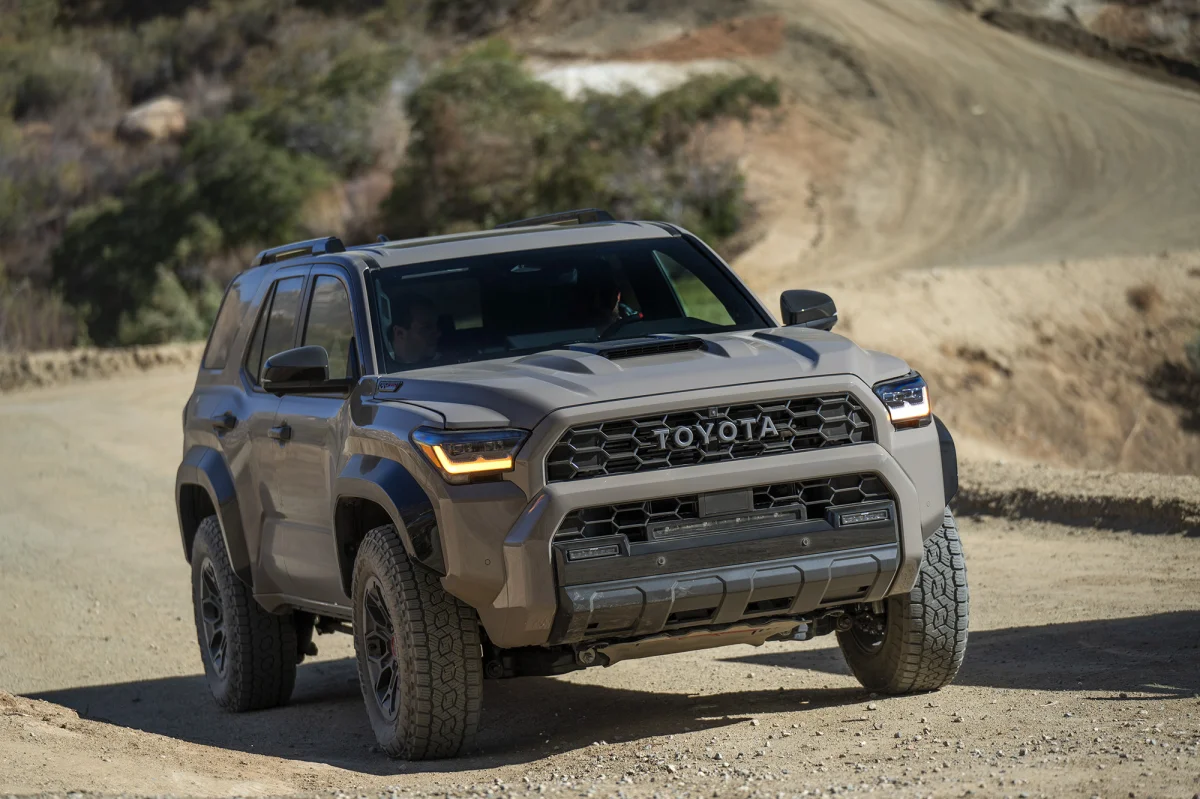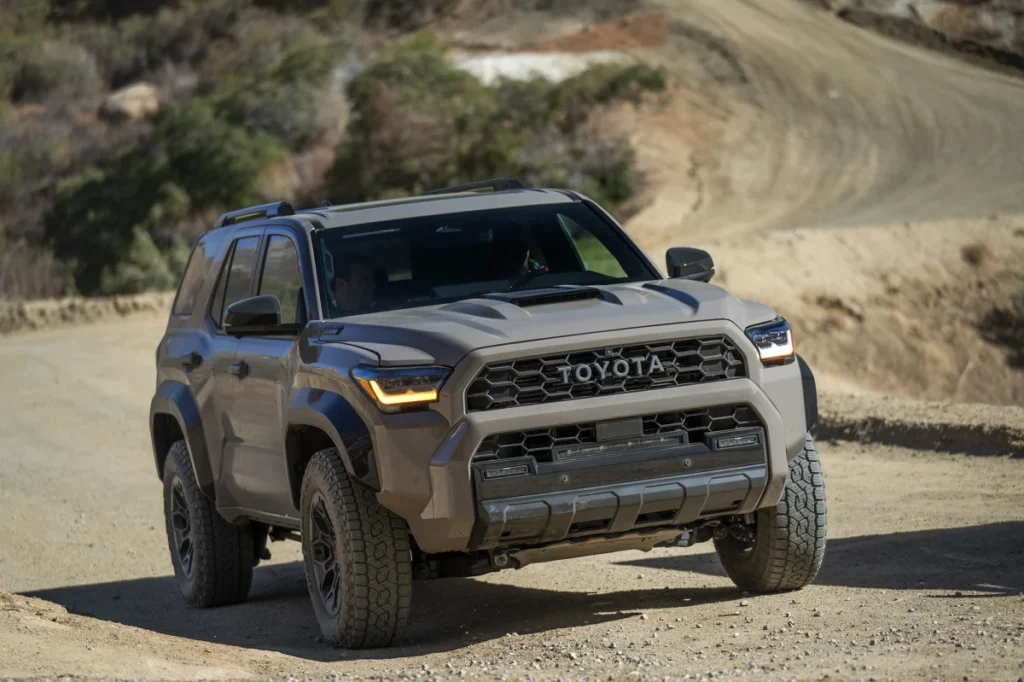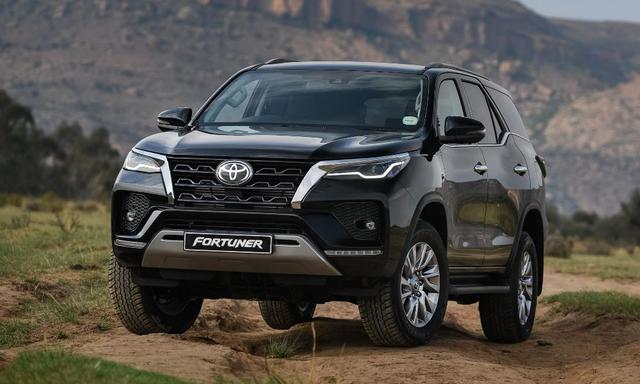

Introduction
The Toyota 4Runner is a renowned mid-size SUV that has cemented its place in the automotive market primarily due to its ruggedness, reliability, and versatile performance. Originally launched in 1984 as a durable off-road vehicle inspired by the Toyota Hilux pickup, the 4Runner has evolved through five generations to become a mature SUV suitable for both adventurous terrains and daily driving needs. Its importance in the market lies in its steadfast reputation as a tough, dependable vehicle that holds its value exceptionally well, making it a favored choice among SUV enthusiasts seeking adventure and long-term ownership.

Design
Exterior:
The Toyota 4Runner has a distinctive boxy silhouette that emphasizes its rugged intent. It features a high ground clearance, aggressive front fascia, and bold proportions that command road presence. The design prioritizes function over form, with features such as skid plates and tow hooks designed for off-road utility. The TRD Pro trim adds unique styling elements such as a hood scoop and exclusive badging that underline its off-road pedigree.
Interior:
Inside, the 4Runner balances utility and comfort. The cabin uses high-quality materials which give a solid and durable feel, though the overall design is somewhat utilitarian with some shared elements from the Toyota Tacoma pickup. Storage is plentiful with multiple bins and pockets, and the optional third-row seat provides extra passenger capacity, suitable mainly for kids or occasional use. Controls are ergonomically placed for ease of use, including chunky climate knobs that are user-friendly even with gloves on. While not ultra-modern in appearance, the interior focuses on durability and comfort, making it well-suited for both on and off-road excursions.
Performance
The Toyota 4Runner is powered by a 4.0-liter V6 engine that produces 270 horsepower. This engine, paired with a five-speed automatic transmission, is tuned more for reliability and torque than outright speed, resulting in a somewhat sluggish acceleration experience. The 4Runner’s body-on-frame construction contributes to a robust and durable platform but results in notable body roll and a less refined on-road ride compared to unibody SUVs. However, it shines in off-road performance with features like part-time four-wheel drive, a locking rear differential, and advanced traction control systems (Multi-Terrain Select, Crawl Control) particularly prominent in the TRD Pro variant. Handling on pavement can feel a bit clunky with noticeable lean around corners, but it delivers confidence and capability in diverse environments and poor road conditions.
Fuel Efficiency
Fuel economy is one of the 4Runner’s weaker areas due to its older drivetrain technology and truck-based design. The EPA rates it at about 16-22 mpg, depending on the drivetrain and trim. Typical figures are around 16 mpg city and 19 mpg highway. Real-world mileage can vary but expects fuel consumption to be on the higher side compared to more modern SUVs. The vehicle’s focus is clearly on capability and durability rather than fuel efficiency.

Features
The 4Runner sports a solid set of features, especially in its infotainment and safety technology. It includes an easy-to-use infotainment system with Apple CarPlay, Android Auto, and Amazon Alexa compatibility. Comfort is enhanced with available features such as a power sunroof, heated seats, and a premium audio system. Safety features come standard with the Toyota Safety Sense-P suite, offering adaptive cruise control, lane departure warnings, automatic emergency braking, and blind-spot monitoring.
Safety
Safety ratings for the 4Runner are commendable with a suite of standard driver-assist technologies. It features Toyota’s Safety Sense-P, which includes adaptive cruise control, lane-keeping assist, automated emergency braking, and automatic high beams. These systems enhance driver confidence and mitigate risks both on and off the road. While crash-test ratings are not the highest in its segment, the vehicle’s robust build and safety equipment provide solid protection for occupants.
Pricing
The Toyota 4Runner is available in several trims, including SR5, TRD Sport, TRD Off-Road, TRD Pro, and Limited. Pricing generally ranges from approximately $40,000 for base trims up to around $53,000 for the fully loaded TRD Pro version. Prices may vary by region and availability but reflect the 4Runner’s position as a premium, capable mid-size SUV with strong resale value.
Pros and Cons
Pros:
- Excellent off-road capability out of the box
- Robust, durable body-on-frame construction
- Strong resale value and reliability
- Good suite of standard safety and driver-assist features
- Spacious and functional interior with optional third row
- Solid and comfortable ride for a truck-based SUV
Cons:
- Sluggish acceleration and outdated transmission
- Below-average fuel economy
- Ride quality can be bouncy and body roll noticeable
- Interior styling and tech feel somewhat dated
- Large turning radius, making parking challenging
- Exhaust noise is pronounced, especially in TRD Pro models.
Comparison Table
| Feature | Toyota 4Runner | Jeep Grand Cherokee | Ford Bronco |
|---|---|---|---|
| Engine | 4.0L V6, 270 hp | 3.6L V6, 293 hp | 2.3L Turbo I4, 270 hp |
| Transmission | 5-speed automatic | 8-speed automatic | 7-speed manual / 10-speed automatic |
| Drive Type | RWD/4WD | RWD/4WD | 4WD |
| Fuel Economy (mpg) | 16/19 city/highway | 19/26 city/highway | 18/20 city/highway |
| Off-road Features | Multi-Terrain Select, Crawl Control | Quadra-Drive II optional | Advanced 4×4 systems |
| Infotainment | Apple CarPlay, Android Auto | Apple CarPlay, Android Auto | Apple CarPlay, Android Auto |
| Safety Features | Toyota Safety Sense-P (standard) | Advanced safety tech standard | Available driver-assist tech |
| Price Range (USD) | $40,000 – $53,000 | $40,000 – $65,000 | $38,000 – $70,000 |
Conclusion
The Toyota 4Runner remains a stalwart choice for anyone seeking a mid-size SUV with serious off-road credibility combined with proven reliability. While it may lag behind competitors in refinement, fuel economy, and modern tech, its ruggedness, strong resale value, and comprehensive safety features make it an attractive option for outdoor enthusiasts and those who prioritize durability over luxury. It is best suited for adventure seekers and families needing versatile space and robust performance in tough conditions. If you value capability and longevity, the 4Runner is definitely worth considering.



